Royal Weddings, Jubilees and the Olympics are all very well, but there is only one street party which really counts and that is the now annual event Crime in the Court hosted by David Headley and Goldsboro Books in Cecil Court in theheart of London’s West End.
The event attracts crime-writers from far and wide and I was delighted to meet, at long last, Aly Monroe, whose historical spy thrillers (Maze of Cadiz, Icelight) I admire greatly.
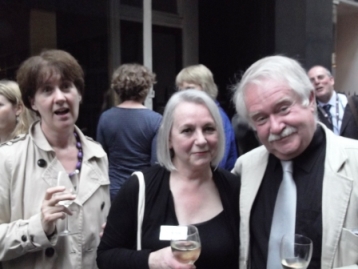
Aly had travelled from Scotland and her publishers, the Jolly magnificent John Murray, had thoughtfully provided her with a trench-coated private eye bodyguard whilst she was in London.
As usual, there were some familiar faces it was difficult to avoid such as Adrian Magson and L.C. (Len) Tyler who had managed to capture the vivacious Charlotte Phillips, a new face on the crime scene of whom, I am sure, we will hear more.

This year’s party had, however, a sad postscript for on my return to Ripster Hall I received the news that international crime fiction connoisseur and former Swedish army officer Iwan Morelius had passed away, aged 80, at his home in Spain.
Regular readers will know that I rarely mention my own meagre contribution to crime fiction, and that I am constantly and pleasantly surprised when others do.
It has recently been drawn to my attention that at least one of my early novels and an even more obscure short story of mine published in America, are referenced in The Mystery Reader’s Walking Guide to London published some years ago and written by Alzina Stone Dale and Barbara Sloane Hendershott, who may well be Americans.
I was not aware of the existence of this noble volume until last month and have never seen a copy. Some extracts, however, are available on the jolly old interweb and from what I can see there, I doubt it will ever replace Professor Barry Forshaw’s so-aptly titled Rough Guide to Crime Fiction, nor indeed the Geographer’s London A-Z which is the Bible for any self-respecting London cabbie.
Anyone questing for the secret to a long and productive life could try crime writing, if the example of two of our best practitioners of that dark art are anything to go by, both now welcoming their ninth decade with new novels.
If my maths is correct, which it rarely is, then Undercover (from the Crème de la Crime imprint of Severn House) is the 29th novel in 27 years by veteran crime writer Bill James to feature his detective duo ofColin Harpur and Desmond Iles.

The Harpur and Iles series have a host of admirers who will rejoice at the news and one in particular – Diamond Dagger winner John Harvey – will, I suspect, already have the book on order, for he has long championed the series.
I have lost count of how many books Diamond Dagger winner Ruth Rendell has written in a career which has spanned (so far) 48 years, and her latest, The Saint Zita Society (published by Hutchinson this month, set in the badlands of Pimlico, sees her back at her most unsettling best.

In case the title puzzles you – which I think it’s supposed to – St Zita is the 13th century patron saint of domestic servants and, so I am informed, the best saint to call on when one has lost ones keys.
I cannot recall too many crime novels being set on the Isle of Wight (or Vectis as it is still known in the Map Room here at Ripster Hall), which is surprising considering that a fair number of crime writers have lived there, including M.J. Trow, Christine Green, Clive Egleton and even (briefly) Charles Dickens.
However, my old chumette Natasha (‘N.J.’) Cooper is setting the record straight with her new novel Vengeance in Mind, out now from Simon & Schuster, which features ambitious young forensic psychologist Karen Taylor.

With Scotland’s inexplicable absence from any international football competitions this year, Scottish crime writers have used the time wisely and we seem to be in for something of a deluge of ‘Tartan Noir’ titles coming out this month.
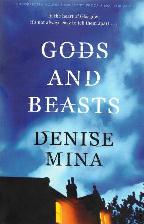
Recently returned from her world tour of New Zealand is Denise Mina, whose new book Gods and Beasts (from Orion) is set in her native Glasgow and features her young female police detective DS Alex Morrow. This is, I believe, the third of Denise’s thrillers to feature Alex Morrow and as Denise has a habit of writing books in threes, one has to wonder if her next will take her on a different tack. In a way I hope not, for the international acclaim she received for last year’s At the End of the Wasp Season was certainly well-deserved.
South of Glasgow, on the wet and windy Scottish coast opposite the Isle of Aran, sits the town of Ayr, the birthplace of Robbie Burns and which, according to one civic website, claims to have been established “before Magna Carta and several years before the Fifth Crusade.” Now every schoolboy knows the date of Magna Carta, but surely this says much for the education system in Scotland if they can date the Fifth Crusade in their tourist brochures. {1213-1221 if you have to ask.}
But I digress. The main reason for mentioning Ayr is because it is the setting of Tony Black’s new thriller The Storm Without from new (at least to me) publisher McNidder & Grace, a company based in that fine (English) town of Alnwick.

Tony Black, apart from being Irvine Welsh’s “favourite British crime writer” (I wonder who Irvine’s favourite Scottish crime writer is?), is already known for his Gus Dury series of noirish thrillers set mostly in Edinburgh. In The Storm Without he introduces a new hero, ex-cop-turned private eye Doug Michie, possibly the first (and only) Robbie Burns-quoting private eye in crime fiction.
In September, one of my favourite Scottish actors (Gregory’s Girl, Local Hero, Your Cheating Heart) turns to the dark side with his first novel Seventy Times Seven, published by those Fabulous Faber Folk.
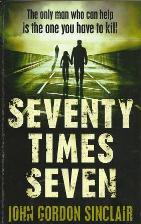
I have only had a quick perusal of John Gordon Sinclair’s Seventy Times Seven but I think I am right in saying the setting of the book is Northern Ireland (and America) rather than Scotland, so I am not sure if it qualifies as ‘Tartan Noir’.
One book I am pretty sure will, and one I am looking forward to immensely, is Ian Rankin’s November title Standing In Another Man’s Grave from Orion, for it marks the return after an enforced retirement five years ago, of Edinburgh’s legendary maverick cop, John Rebus.
In the interim between the last Rebus and this new one, Ian has not been idle and in The Complaints he created a new series hero, Malcolm Fox, a policeman who polices the police. Fox was an interesting character and Ian Rankin’s plotting and pacey writing were well up to the high standard he set himself years ago. Yet for some reason – and I cannot put my finger on it – I never warmed to the tea-total, non-drinking abstainer Malcolm Fox. For the life of me I cannot think why I never connected with this tea-total, non-drinking, abstaining character when I have always found all Ian’s previous characters to be engaging, believable and, however flawed, totally human.
Suffice it to say that now Rebus is back I am sure I will be once more be made welcome in the infamous Oxford Bar in the heart of Scotland’s fair capital city.
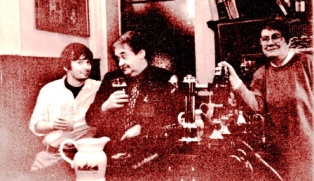
At last month’s Hay Festival, announcing the return ofRebus, Ian caused quite a stir by daring to suggest that “people are getting tired” of Scandinavian crime fiction. He also admitted to being jealous of the fact that a Rebus novel would be compressed into 45 minutes of television, whereas a piece of Scandinavian crime fiction could get 20 hours of air time.
I am loathe to correct Ian in public, but it really isn’t 20 hours. It just seems like that.
With a very red face I am ashamed to admit that I have only just seen a copy of Margery Allingham: 100 Years of a Great Mystery Writer, a ‘festschrift’ appreciation edited by Marianne van Hoeven for the Margery Allingham Society in 2003, in preparation for Margery’s centenary in 2004.
{Should anyone reading this not know who Margery Allingham was; please leave the interweb immediately.}
Despite being one of the most physically uncomfortable books I have ever handled (wrong weight of paper, poor binding and bizarre typesetting), this volume boasts a stellar cast of contributors: Sara Paretsky, Andrew Taylor (a quite brilliant Introduction), Catherine Aird, the late Harry Keating, Jessica Mann, Natasha Cooper, Margaret Yorke (who had tea with Allingham in Harrods in1958), June Thomson and Robert Barnard (who, although born on the edges of the Essex salt marshes was always a confirmed Agatha Christie, rather than Margery, fan).
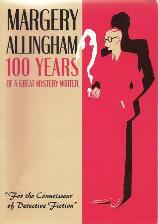
As a dedicated fan of Margery Allingham myself, I am distraught that I was not among the contributors to this celebratory anthology and immediately assumed that my omission was due to ‘legal reasons’ until I remembered that at the time this excellent volume was being compiled, I was hors de combat in the Stroke Unit of the local hospital, busily researching my first non-fiction book. (Ironically the same hospital, in name at least, in which Margery Allingham died in 1966.)
Imagine, then, my pride and joy when I discover – nine years after publication – that I am actually quoted in one of the essays in the book, and by Professor B.J. Rahn no less.
Now Professor Rahn is not known for quoting fools gladly so I am very pleased that what I had written in an article on Allingham’s famous detective Albert Campion in the Strand Magazine found favour with her.
I am equally proud of the fact that I also find myself quoted, even if un-credited, in the advance proof copies (available to only a select few) from Hodder of Deon Meyer’s new thriller 7 Days, which is published to the general public in September.
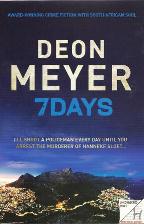
In 2011, I picked South African Meyer’s wonderfully complex (well up to Le Carré standard) ‘spy the beloved country’ thriller Trackers as the Shots Thriller of the Year, which probably hexed Mr Meyer and ruined his chances of winning any of the “official” crime-writing awards run by the Ministry of Mystery Prizes. However, I stand by what I said – that Trackers was a masterpiece – and am really looking forward to reading, praising and thereby cursing, 7 Days.
Sorry, Deon.
For the third year running I have been honoured by being asked to be one of an international panel of judges for the Ngaio Marsh Award for crime fiction in New Zealand.
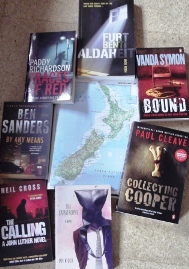
The ignorant will, of course, assume that New Zealand crime fiction began and ended with Ngaio Marsh and the so-called ‘Golden Age’ of detective stories. The more enlightened few with memories which stretch all the way back to the 1990s, will recall the name of Paul Thomas and the NZ connections of UK crime writers Stella Duffy and Chris Niles. Those who have kept an ear to the crime-writing ground in the last decade should certainly have registered the names of Paul Cleave and Vanda Symon already; and if they haven’t they will – and there are more names to come in what seems to be a pool of crime writing talent which is spreading in volume and deepening in quality. [I should not of course, forget Neil Cross, who is certainly well-known and successful here and does indeed live in New Zealand, but his crime fiction is set in the UK, and so arguably does not write about crime in NZ.]
And the crimes of New Zealand as described in their modern fiction are especially grim and shocking to a reader of a delicate constitution such as myself. I had no idea there were so many serial killers, home invaders and drug-takers in New Zealand. (Christchurch seems one place the timid should avoid in particular.) Not that I wish to appear patronising. I knew, of course, that there were ‘rough areas’ where the unwary are advised against wandering – one is, I believe, called Mordor – just as there are gay and artistic areas of high culture, such as the famous Rivendell District.
Yet if one simply judged on the violence and body count of its recent crime fiction, it would appear that per capita, New Zealand is rapidly shaping up as a more dangerous place than, say, Sweden.
There has been a very welcome revival of interest in the work of British thriller writer Desmond Cory of late, thanks partly due to the reissue of one of his ‘Johnny Fedora’ novels, Undertow, as a Top Notch Thriller, but mainly through the efforts of his sons John and Richard McCarthy, who have made some long out-of-print Cory novels available as eBooks.
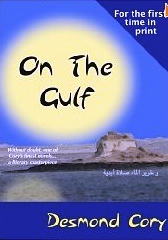
Shaun Lloyd McCarthy (1928-2001) was a versatile and prolific writer of spy stories, crime novels and psychological thrillers. His legendary hero Johnny Fedora being one of the first ‘licensed to kill’ British agents who made his fictional debut some two years before a certain other British agent did in Casino Royale.
The latest nugget to be mined from the Cory archive is a previously unpublished thriller, On The Gulf, which has been released as a Kindle eBook (http://www.amazon.com/On-the-Gulf-ebook/dp/B0086O623Q ).
Set in an unstable oil-rich Emirate in the Arabian Gulf, Desmond Cory started work on the novel in 1982 and revised it many times before completion in 2000 shortly before his death.
I am delighted to be able, finally, to confirm that Titan Books have re-published three fabulous thrillers by that ‘Queen of spy writers’ Helen MacInnes: Above Suspicion, Pray for a Brave Heart and, as I forecast, one of my favourites, Assignment in Brittany.

Not only is Helen MacInnes worthy of a place in the spy fiction hall of fame because she was one of the earliest of the few female writers in the modern genre, but also because she was pretty good at it. Her first remarkable thrillers, written when she was in her early thirties, warned of the dangers of a Nazi-dominated Europe and were written in the very early daysof WWII, clearly with a view to influencing American public opinion. (MacInnes was a Scot who, with her husband, had moved to live and work in America).
For anyone who doesn’t know the work of MacInnes, the three Titan reissues are a brilliant start, but the really good news is that later this year Titan will republish four more MacInnes titles from the 1960s: North From Rome, Decision At Delphi, The Saltzburg Connection and The Venetian Affair, which was filmed in 1967 starring Robert Vaughn and Boris Karloff.
|
|
Modern Classics
I can also confirm the rumour being whispered in the dark alleys and on the mean streets where hardboiled crime fiction is discussed, that the four ‘Hoke Moseley’ books by the legendary Charles Willeford - Miami Blues, Sideswipe, The Way We Die Now and New Hope For the Dead – are to be republished this August as Penguin Modern Classics no less.
 + + 
I first came across the work of the late, great Willeford shortly before his death in 1988. In those far off days – though it is now difficult to believe – British publishers had a mantra that ‘Americans don’t sell’ and it was far from easy to get hold of the work of such as James Ellroy, Carl Hiaasen, James Crumley, Elmore Leonard, James Lee Burke or Andrew Vachss. That attitude was to change in 1991 when both John Grisham and Patricia Cornwell burst on the scene.
But in those pre-internet days of 1988, anyone with a taste for the hardboiled was heavily reliant on the marvellous, evangelical work of the Murder One bookshop in London, which stocked imported American paperbacks and indeed it was Murder One’s Maxim Jakubowski who insisted (by locking the doors and not allowing me to leave) that I try Charles Willeford’s Sideswipe. The next day, I was back demanding more.
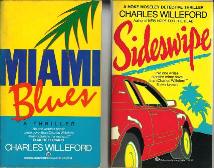
Three years later, Maxim edited the book 100 Great Detectives (Xanadu, 1991) in which a hundred writers each contributed an essay on the favourite fictional detective, as long as it was not his or her own creation. It is a fascinating book, though I suspect long out of print, which contains such gems as Michael Moorcock on Margery Allingham’s Albert Campion, Julian Symons on Dashiell Hammett’s Sam Spade, Frances Fyfield on Michael Dibdin’s Aurelio Zen and Harry Keating on (who else?) Sherlock Holmes.
When Maxim asked me to contribute, I jumped at the chance and chose Willeford’s detective Hoke Moseley as my subject, writing my essay in the form of Moseley’s Last Will and Testament.
The four Miami-set Moseley books, written in the 1980s, proved to be Willeford’s swan-song, though he had produced some stunning noir stories as far back as 1953. If he never received his due credit in his lifetime, the new editions, rightly called ‘modern classics’, may go some way to keeping his work alive and bringing it to a new readership.
Reviving fine thriller writing – rescuing too-quickly forgotten books for a new generation of readers – is of course a noble calling and one which I have adopted myself. (I may have mentioned this en passant in a previous column.)
 
The latest reissues from the Top Notch Thriller imprint of Ostara Publishing perfectly illustrate the arc of Great British thriller writing: a classic Cold War spy thriller first published in 1981 but set in 1948 Berlin just at the time the city was set to be gobbled up by Stalin’s Soviet imperialism, and a ‘ripping yarn’ in the tradition of Rider Haggard, A.E.W. Mason, John Buchan and Geoffrey Household which takes the hero on a perilous journey across India and Pakistan and into the foothills of the Himalayas.
David Brierley’s Big Bear, Little Bear is, arguably, his masterpiece of betrayal and espionage on both a small, very personal scale and on the international stage of power politics. As Stalin (the ‘big bear’) prepares to take over the devastated city of Berlin (the ‘little bear’) and the Americans make plans to keep the city out of Russian hands, George Orris, an embittered British agent, stakes himself out as a Judas Goat to flush out the traitor who has betrayed him. Taut, tense, often heart-breaking, and stuffed with spy ‘tradecraft’, this is a thriller which ranks with the best of Le Carré, John Lawton and Alan Furst.
The Pass Beyond Kashmir was only Berkely Mather’s second novel, although by 1960 he was well-established as one of the most prolific writers of drama for radio and television, receiving a very rare (if not unique) Award of Merit from the Crime Writers Association, which he was to chair in 1966-67. His classic adventurer thriller, which showed his great affection for the India of the post-Raj period, received rave reviews from Anthony Price (a decade before he himself went on to write excellent thrillers) and Ian Fleming, who liked it so much he insisted that Mather join the script-writing team working on Dr No.
A fascinating biography of Mather (John Weston Davies) by his son is available, along with details of all Top Notch Thrillers on the website www.ostarapublishing.co.uk.
In my youth I was aregular and enthusiastic attendee at crime writing conventions; in fact I think I hold the record for being the only crime writer to attend all those splendid Shot in the Dark/Shots on the Page events in Nottingham in the 1990s beginning with a tentative ‘sideshow’ panel at what was basically a film festival, starring alongside John Harvey and Mike Phillips.
However infirmity, decrepitude, writs, injunctions, restraining orders and various other legal reasons have conspired against my attendance at many of the no doubt splendid events on offer these days.
One such convention has recently caught my eye: Crime Fiction here and there, now and then and it appeals because it seems to combine the popularity of a very popular genre with suitable academic gravitas.
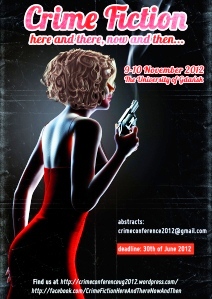
The conference takes place in November at the University of Gdansk in Poland (the proceedings are in English) and I am told that accommodation will not be a problem now that a horde of English football fans have cut short their bookings….
An Olympic Summer (of Reading)
With London publishers already resigned to four-day weeks (one more than normal, cynics would say) as Wimbledon kicks in; and then rising absenteeism amongstaff due to the Olympics, it is just as well that they have some splendid titles on the stocks to keep us poor readers occupied during the long hot summer.
I have already made a start, for I have been drooling over the prospect of Alan Furst’s Mission to Paris ever since Weidenfeld first listed it (originally as the Spies of Paris) a year ago. It does not disappoint – for me, Alan Furst cannot disappoint. With an iron grasp on his historical setting (Europe just before WWII) and his ability to create characters or atmospheres economically and without pretension, he once again gives a master class in spare thriller writing which those of us with lesser talents can only gawp at, slack-jawed.
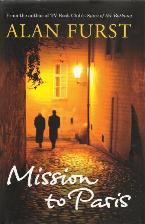
Mission to Paris is almost like watching Casablanca. Hardly a line seems out of place, there is romance, heroism, humanity and a noble cause. When there is violence, it is quick and shocking or faintly ludicrous, which fits perfectly into the plot of how a 1930s Hollywood studio movie star (a European émigré) is loaned to a French production company, only be recruited into the world of espionage. The problem is that not only is our hero an amateur at spying, so are the people he’s spying for who have come late to the game, whereas the Nazi ‘political warfare’ machine is up and running with ruthless efficiency.
I have already reserved time in August for another historical spy thriller, the third novel by the talented Andrew Williams, The Poison Tide from the Jolly Magnificent John Murray. In his first two, immaculately-researched novels, Andrew tackled the Battle of the Atlantic in WWII (with a cameo role for Ian Fleming) and then 19th-century Russian politics, complete with Tsars, secret policemen and anarchists in abundance.

With The Poison Tree, he moves in to the First World War and the early days of the British Secret Service Bureau and a spy hero operating in both Berlin and New York in 1915.
Back in the (almost) present day, I have two private eye stories lined up to vary my fictional diet.
Out almost any day now from Serpent’s Tail, is Weirdo by Cathi Unsworth, who has been described as ‘the first lady of noir fiction’ – not a description I would automatically link to someone who was brought up in Great Yarmouth. However in Weirdo she uses the coastline and landscape of Norfolk as her ‘mean streets’ down which to send her ex-cop-turned-private investigator to dig into (or dig up) the case of a 15-year-old girl convicted ofmurder back in 1984.
The local community, having plenty to hide and this being Norfolk, naturally clams up.

On perhaps more traditional territory – America – I have been urged by enthusiasts at publisher Headline to try Amanda Kyle Williams’ second novel to feature Keye Street, Stranger in the Room when published in August.
Keye Street, I am told, is a name to watch when it comes to fiction al detectives – a Chinese American former FBI profiler turned private eye, operating in Atlanta, Georgia, a city I visited many times before a misunderstanding with Homeland Security on the statute of limitations concerning charges of arson.
I am urged by fans of Keye Street at Headline that I really must give this new heroine a try, and so I shall, but I note with some trepidation that on the author’s own website, the character of Ms Street is described as being ‘sober for four years now’ which I find slightly ominous.
Speaking of (female) private eyes, I must put a spurt on for I am behind in my reading of the latest Sara Paretsky novel to feature her Chicago detective V.I. Warshawski, Breakdown, which is already available from Hodder.
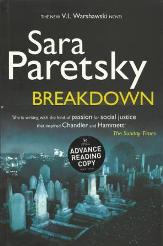
And although not technically a female private eye, but rather a female psychiatrist investigator, I looking forward to the return of Frieda Klein in the new Nicci French novel Tuesday’s Gone, after her debut last year in Blue Monday. Publishers Penguin have done an excellent production job on the book and the endpapers feature a map of the perhaps surprising route of the River Tyburn though London which is a tantalising introduction to any mystery.
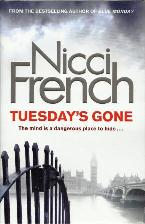
In August, should my eyesight survive, I am on a promise to those enthusiastic publishers Pan to read The Lost Library by the mysterious ‘A.M. Dean’ which I am told is a pseudonym for a professor of theology and practising monastic priest.
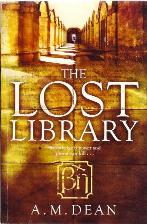
The book appears to be the sort of novel I once tried to categorise as ‘the Quest Thriller’ – in other words, a modern-day thriller based around a legend/artefact from the past. You know the sort of thing I’m talking about. It is sometimes referred to as a genre created by Dan Brown (around 2000) or Sam Bourne (in 2006) but some of us are old enough to remember great books by Lionel Davidson and Peter Van Greenaway and even Dennis Wheatley.
The Lost Library, of course, refers to the great library of Alexandria which may or may not have been destroyed (it certainly seems to have disappeared) by the 6th century AD. It does not, I am assured, have anything to do with the several sealed rooms full of crime novels which are supposed to be present somewhere here in the precincts of Ripster Hall.
The recent Shots/Ostara Crime competition to win the first three reissues of Christine Green’s “Kate Kinsella Mysteries” attracted a record number of correct entries. The winner, selected at random by a mildly intelligent computer, was Christine Johnson of Kendal in Cumbria.
To celebrate the second author to be featured by Ostara Crime, Denise Danks, a new competition is being run in conjunction with Shots for the chance to win Denise’s first three ‘Georgina Powers’ thrillers: The Pizza House Crash, Better Off Dead and Frame Grabber.
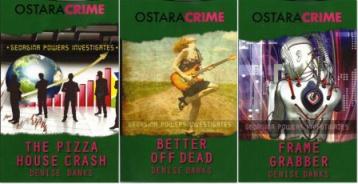
The competition question may require a little bit of research in the Author Profile of Denise Danks on the Ostara website, found by following the links to her books. (www.ostarapublishing.co.uk) .
Open only to readers of Shots, entries should be submitted via the CONTACT US button on the Ostara website Home Page, putting GEORGINA POWERS in the subject line, and with the answer to the following question:
In 2001, Denise Danks (and Georgina Powers) won a Sherlock Award for Best Fictional Detective, but which well-known actor presented the award during the Crime Scene convention at the National Film Theatre?
The competition closes at midnight on 28th July and the winner, chosen at random from all correct entries, will be announced in next month’s Getting Away With Murder.
I understand that this year’s Bodies in the Bookshop celebration of crime fiction in Cambridge will be crucially different (as far as the Trades Descriptions Act is concerned) from the previous 21 annual events in the sense that it will not actually be held in a bookshop.
Scheduled for Saturday (another break with tradition) 14th July from 10 a.m. until, I guess, sunset in the Cambridge Union, this year’s event also dramatically veers away from the time-honoured tradition of “No Speeches” by having speakers and panels of crime-writers – or so I am led to believe. As, for legal reasons, I will not be present, details are a little sketchy.
However, I know Professor Barry Forshaw will be attending and would be very surprised if he is not persuaded to give his three-hour lantern-slide lecture on British crime films, some of which I believe were in colour. Professor Forshaw is an acknowledged expert on the subject and indeed has a book out, British Crime Film: subverting the social order, from Palgrave Macmillan in August.

Owing to a long-running misunderstanding with the Department of Homeland Security, I was unable to attend the launch party in the plush, nay hallowed, halls of the New York Yacht Club, for the reissue of The Shipkiller by my old friend and fellow boulevardier Justin Scott and his delightful wife Amber.
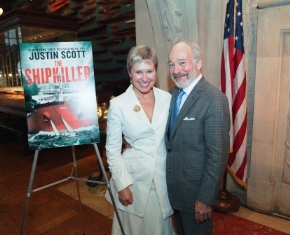
The new, and very attractive, edition of Justin’s world famous maritime thriller (where a 40-foot yacht takes on an 1800-foot super tanker, and this time it’s very personal) from the Pegasus Crime imprint, comes on the 35th anniversary of its first publication. Which makes one think: where has the time gone?
It seems like only yesterday, but in fact it was 1976, two years before Shipkiller was originally published, that Justin was photographed as a young boulevardier in the company of American thriller writing icons Donald Westlake and Brian Garfield at the New York premiere of the movie The Last Hard Men, made from one of Brian Garfield’s novels.
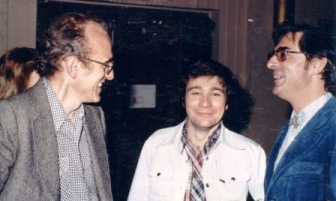
Clearly life is treating him well, for he has hardly changed and continues to boulevard in exalted circles – I believe that in when in London, he dines regularly at the House of Lords – whereas those of us resigned to more humdrum lives can take cold comfort in the fact that we never threw away the negatives….
Toodles!
The Ripster
|